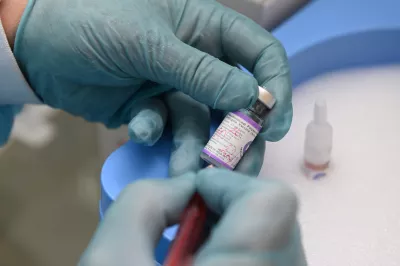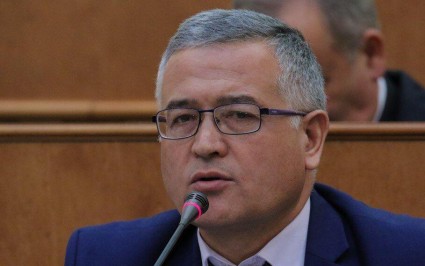The World Immunization Week has started, scheduled from April 24 to April 30. In recognition of this event, the UNICEF office in Uzbekistan highlighted the achievements in child and adult immunization, which the Ministry of Health of Uzbekistan is developing with the support of this UN fund.
In Uzbekistan, UNICEF’s technical assistance, in collaboration with Gavi, WHO and USAID, significantly improved immunization services and infrastructure, benefiting 3.5 million children through the National Immunization Programme, UNICEF noted.
This includes ensuring a steady supply of safe vaccines, allowing 950,000 children to receive three doses of the diphtheria, tetanus and pertussis (DPT) vaccine annually.
In 2023, UNICEF facilitated the procurement of 28.1 million routine immunization doses and 10 million COVID-19 vaccine doses through the COVAX facility. The Ministry of Health (MOH) reports 96% coverage with routine vaccines and 54.1% completion of the COVID-19 primary vaccination series. Additionally, 47.3% of the population (16.1 million people) received a booster, with no vaccine stockouts reported.
UNICEF in Uzbekistan supports the Ministry of Health in purchasing vaccines through collaboration with the UNICEF Supply Division, which makes vaccines more accessible and enables them to be purchased at an affordable price, the organization’s country office stated.
To increase immunization coverage, UNICEF, as one of the largest buyers of vaccines in the world, procures more than 2 billion doses every year on behalf of countries and partners for reaching almost half of the world’s children. It also works to distribute vaccines to the last mile, ensuring that even remote and underserved communities have access to immunization services.
“Thanks to vaccinations, more children now survive and thrive past their fifth birthday than at any other point in history,” said UNICEF Executive Director Catherine Russell. “This massive achievement is a credit to the collective efforts of governments, partners, scientists, healthcare workers, civil society, volunteers and parents themselves, all pulling in the same direction of keeping children safe from deadly diseases. We must build on the momentum and ensure that every child, everywhere, has access to life-saving immunizations.”
UNICEF’s support in Uzbekistan improved the efficiency of the immunization program, enhancing vaccine storage and distribution. This included strengthening cold chain infrastructure, conducting temperature mapping assessments in all vaccine warehouses, and deploying a Remote Temperature Monitoring System (RTMS) in all 221 vaccine warehouses. RTMS enables real-time monitoring and timely intervention to maintain optimal storage conditions.
Further, UNICEF supports Uzbekistan with digital technologies, which are leveraged to strengthen the immunization system and supply chain. UNICEF developed and implemented the Electronic Immunization Registry (EIR), ensuring interoperability with other systems.
8,000 vaccination staff received training on EIR operation and computer literacy skills, supported by the procurement of 3,000 tablet PCs. This initiative aims to provide citizens with online access to their immunization records through a one-stop web portal in 2024.
“The story of immunization in Uzbekistan is a story of human triumph,” said Geoffrey Ijumba, Deputy Representative, UNICEF Uzbekistan. “From the mothers, the patronage nurses, the mobile vaccinators and the warehouse managers and drivers, truly showing what is humanly possible.”
Globally, including in Uzbekistan, immunization programs, have shown what is humanly possible when many stakeholders, including heads of state, regional and global health agencies, scientists, charities, aid agencies, businesses, and communities work together, UNICEF stated.
Today, WHO, UNICEF, Gavi, and BMGF are unveiling “Humanly Possible”, a joint campaign, marking the annual World Immunization Week, 24−30 April 2024. The worldwide communication campaign calls on world leaders to advocate, support and fund vaccines and the immunization programmes that deliver these lifesaving products — reaffirming their commitment to public health, while celebrating one of humanity’s greatest achievements.
Vaccination has averted 154 million deaths, meaning six lives per minute annually, over the past 50 years, including 101 million were infants, according to the research published by a medical journal The Lancet.
The research estimates that WHO’s Expanded Programme on Immunization (EPI) has provided the single greatest contribution, not only to improved infant survival but also to increased survival probability observed well into late adulthood.
Over the past 50 years, vaccination against 14 pathogens (diphtheria, Haemophilus influenzae type B, hepatitis B, Japanese encephalitis, measles, meningitis A, pertussis, invasive pneumococcal disease, poliomyelitis, rotavirus, rubella, tetanus, tuberculosis, and yellow fever) has accounted for 40% of the observed decline in global infant mortality.
Thanks to polio vaccination, over 20 million individuals who would otherwise have been paralyzed are now able to walk, bringing the world to the brink of complete polio eradication.
Advances in child survival underscore the importance of protecting immunization progress in every country in the world and accelerating efforts to reach the 67 million children who missed one or more vaccines during the pandemic years.
Global coverage with third dose diphtheria, tetanus, pertussis containing vaccine (DTP3), a proxy for vaccine programme performance, has increased from less than 5% in 1974 to 84% currently.
The next 50 years of EPI will require not only reaching the children missing out on vaccines, but protecting grandparents from influenza, mothers from tetanus, adolescents from HPV and everyone from TB, and many other infectious diseases.















